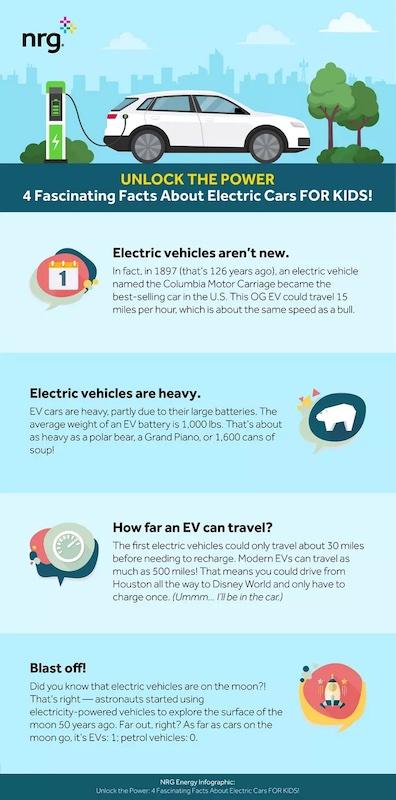Discover the Top 5 Benefits of Electric Cars for Families
Originally published on NRG Energy Insights
Is there a hybrid or electric contender on your family’s list of vehicles to consider next? In an era where environmental consciousness and technological advances are continuously converging, electric cars are becoming a desirable option for families across the world striving to make eco-friendly choices without compromising their daily convenience. And yet, the paradigm shift can seem overwhelming.
We connected with Danita Park, Director of EV and Commercial Development at NRG, to learn more about this transition. What did we learn? Myths and misconceptions about electric vehicles (EVs) abound, and deciphering the truth about them isn’t always easy.
The reality is, EVs offer both substantial environmental benefits and unexpected advantages for families.
1. Cost savings that matter
Financial planning plays a pivotal role in decision-making for families, and electric cars, trucks, and SUVs offer a compelling advantage. While the purchase cost of electric vehicles might be slightly higher than their gasoline counterparts, new incentives to make the switch, coupled with the long-term savings, are remarkable. Individuals with a qualifying adjusted gross income may be eligible for a tax credit of up to $7,500 for new EVs and hybrids, and up to $4,000 for used ones. You can learn more about the eligibility requirements at fueleconomy.gov.
What about electricity costs? A 2020 Consumer Reports study showed that EV drivers spend an average of 60% less each year on fuel costs than gas-powered cars drivers.1 In terms of energy consumption, “Electric vehicles are orders of magnitude more efficient,” noted Park. EVs convert over 77% of the electrical energy they tap from the grid to power at the wheels. Conventional gasoline vehicles only convert about 12%–30% of the energy stored in gasoline to power at the wheels.2 Both internal combustion engine (ICE) vehicles and EVs range in efficiency, and a family’s annual savings will depend on gasoline and electricity rates in their area.
Moreover, maintenance costs are substantially reduced as electric cars have fewer moving parts that can wear out over time. Families can bid farewell to oil changes, exhaust system repairs, and other costly maintenance procedures. This results in considerable savings over the lifespan of the vehicle, providing families with the ability to allocate money to other essential needs.
2. Cancel carbon pollution
For families concerned about their carbon footprint, EVs provide a solution they can take pride in. With zero tailpipe emissions, EVs contribute to cleaner air and a healthier environment. This is especially true, said Park, if the electricity you use to charge your vehicle is produced from renewable resources. By adopting electric cars, families play an active role in reducing greenhouse gas emissions.
3. Comfort meets technology
Parents everywhere know that peaceful car rides are a rare gem, especially during family road trips and commutes. Electric cars provide an unexpected serene driving experience. The absence of a noisy internal combustion engine results in remarkably quiet rides, allowing families to hear one another (or hear the music you’re jamming out to) more easily.
Additionally, electric vehicles often offer smooth acceleration and more space (goodbye engine under the hood — hello frunk!).
And as Park put it, “EVs are more similar to an iPhone than to a petrol car.” This allows drivers to customize things they wouldn’t ordinarily be able to, like their braking and driving experience. The payoff? A more comfortable and enjoyable ride for passengers, especially the littles who may be more prone to sensitivity when it comes to abrupt movements.
4. Safety prioritized
Safety is a top concern for families, and electric cars definitely deliver on this front. EVs are engineered with a lower center of gravity due to the location of their heavy batteries. This enhances stability and reduces the risk of rollovers.
What about fires? Studies in the U.S. and abroad have shown that EVs have a lower risk of fire compared to petrol cars.3 They undergo rigorous safety testing and have multiple layers of protection, such as thermal management systems and fire-resistant materials. While fires involving any vehicle can occur due to various reasons, it’s important to note that modern EVs are engineered to minimize fire risks and protect occupants.
Moreover, electric cars are designed with advanced safety features and cutting-edge technology, including collision avoidance systems, automatic emergency braking, and adaptive cruise control. These are just some of the tech enhancements that provide an added layer of protection, giving families more peace of mind when they hit the road.
5. Plug in to convenience
Contrary to common misconceptions, charging electric cars can be convenient for families. The ability to charge at home means no more trips to the gas station to fill up. With fast home charging stations, families can effortlessly charge their EVs overnight, ensuring a full battery each morning.
Park also pointed out that the average driver in the U.S. only drives about 37 miles per day. A full charge in most EVs on the market today can get you well over 300 miles of travel distance; so anyone who drives the average daily amount would only need to charge their vehicle once per week. This level of convenience is game-changing, especially for parents juggling busy schedules.
With the convenience of charging at home or work, many EV drivers find that they only occasionally charge on the go. The growing network of public charging outlets (currently over 138K in the U.S.4) offers families the flexibility to power up as needed during outings, turning recharging into an opportunity to explore and take a break.
So, what’s the truth about EVs? Electric cars aren’t just vehicles; they’re leading a true paradigm shift toward sustainable, family-friendly transportation. These benefits underscore the fact that EVs are not only relevant, but exceptionally advantageous for families. As we collectively navigate the road to a greener future, families have the opportunity to embrace electric cars as a practical, eco-conscious choice that seamlessly aligns with their values and needs.
Unlock the Power
4 Fascinating Facts About Electric Cars for Kids!
- Electric vehicles aren't new.
In fact, in 1897 (that's 126 years ago), an electric vehicle named the Columbia Motor Carriage became the best-selling car in the U.S. This OG EV could travel 15 miles per hour, which is about the same speed as a bull.
- Electric vehicles are heavy.
EV cars are heavy, partly due to their large batteries. The average weight of an EV battery is 1,000 lbs. That's about as heavy as a polar bear, a Grand Piano, or 1,600 cans of soup!
- How far an EV can travel?
The first electric vehicles could only travel about 30 miles before needing to recharge. Modern EVs can travel as much as 500 miles! That means you could drive from Houston all the way to Disney World and only have to charge once. (Ummm... I'll be in the car.)
- Blast off!
Did you know that electric vehicles are on the moon? That's right - astronauts started using electricity-powered vehicles to explore the surface of the moon 50 years ago. Far out, right? As far as cars on the moon go, it's EVs: 1; petrol vehicles: 0.
1 https://www.nrdc.org/stories/electric-vs-gas-cars-it-cheaper-drive-ev
3 https://www.kbb.com/car-news/study-electric-vehicles-involved-in-fewest-car-fires/



